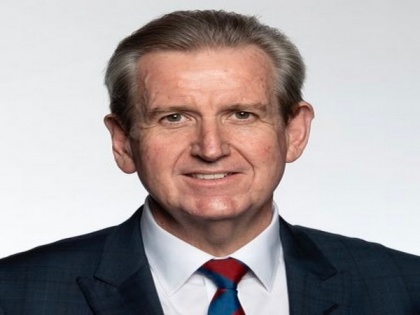Modi, Morrison virtual meet would reflect how like-minded democracies need to work together post-COVID-19: Envoy
By ANI | Published: June 1, 2020 07:32 PM2020-06-01T19:32:12+5:302020-06-01T19:45:07+5:30
Noting that relations between India and Australia are at a "historic high", Australian High Commissioner Barry O'Farrell on Monday said that Prime Minister Narendra Modi and his Australian counterpart Scott Morrison's upcoming virtual meet will reflect how like-minded democracies need to work together in the post-COVID-19 era.

Modi, Morrison virtual meet would reflect how like-minded democracies need to work together post-COVID-19: Envoy
Noting that relations between India and Australia are at a "historic high", Australian High Commissioner Barry O'Farrell on Monday said that Prime Minister Narendra Modi and his Australian counterpart Scott Morrison's upcoming virtual meet will reflect how like-minded democracies need to work together in the post-COVID-19 era.
Prime Minister Modi and Scott Morrison will be holding a virtual summit meet coming Thursday. This is the first high-level bilateral virtual meet since the outbreak of COVID 19 in which Prime Minister Modi will be participating.
"India and Australia relations are on historic high. We have strong collaboration in defence and cybersecurity, agriculture, biotech, education, logistic support agreement, critical supply chains. It is crucial for like-minded democracies to work together in the post-COVID-19 world. This summit will reflect that India and Australia relations will scale greater heights," said Barry O'Farrell.
The envoy said the two leaders will be discussing how their countries are dealing with COVID-19 and they may share "commentary on the hard task of how to ease restrictions and not lose sight of lives".
"They are both people's persons. They will be talking about how to work together to improve the lives of people. They both believe the government is not about the number of agreements signed but to improve the lives of citizens, generating jobs. Virtual summit meet will be like a virtual interview between the two friends sitting on either side discussing how each country is dealing with COVID-19. They may share commentary on the hard task of how to ease restrictions and not lose sight of lives," he said.
Asked whether the much-talked-about logistic support agreement will be signed during the meet, Brian O'Farrell said he does not want to preempt.
"I do not want to preempt. We talked about mutual logistic support agreement that will make it easier for exercises and cooperation between our security forces," he said.
During the summit, scheduled for June 4, Modi and Morrison are expected to ramp up efforts to diversify Australia's export markets and find trusted suppliers of vital products and components.
The envoy also praised the Quadrilateral group and said that forum has helped bring about a lot in cooperation during the COVID-19 crisis and in issues related to maritime and cyber terrorism. The Quadrilateral grouping consists of India, Australia, USA, and Japan.
He added that Australia continues to support India at the Financial Action Task Force (FATF) and decry those who are channelling funds to terrorist orgzations.
The envoy also emphasized the need to strengthen global institutions like the World Health Orgsation (WHO) and also cited Prime Minister Modi comments during G20 and Non-Aligned Movement (NAM) in which he advocated strengthening of WHO and making global institutions more representative with humty as a priority.
"As two major powers in the Indo-Pacific region, it is not only our commitment but the obligation of Australia and India to keep the region safe, secure and protected," he said.
Speaking on the ongoing conflict at the border between India and China, Barry O'Farrell said it's a bilateral issue and, as a norm, it should be resolved bilaterally and Australia and any other country has no role in it.
( With inputs from ANI )
Open in app